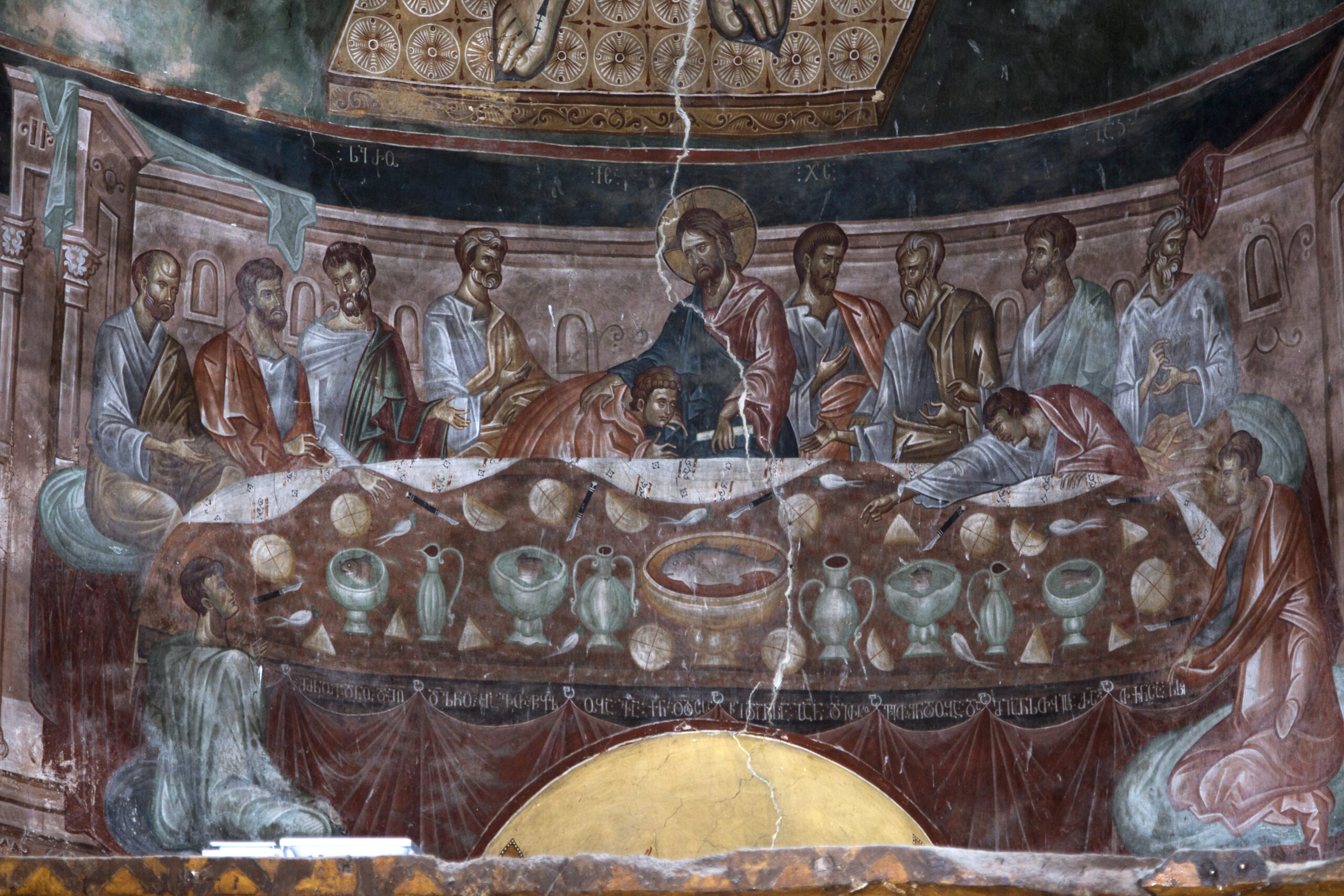
Thursday morning is marked by the service of the Vesperal Liturgy of St. Basil the Great. Though we recall the Mystical Supper during every Divine Liturgy, now, in particular, we are reminded of the very first Eucharist served by our Lord Himself. The Gospel reading is made up of verses taken from not one but three of the Holy Gospels: Matt. 26:2-20; John 13:3-17; Matt. 26:21-34; Luke 22:43-45: and Matt. 26:40-27:2.
The Mystical Supper is the fulfilment of the Passover (Pascha) of the Old Testament when the Lord passed over the homes of the Israelites and prevented the destroyer from bringing death upon the inhabitants as it was that night brought upon the firstborn of Egypt. The Lord passed over only those homes whose doorways had been marked with the blood of an unblemished sacrificial lamb. Christ is the true unblemished Lamb and Son of God, whose Blood delivers us from death, and so the Passover ritual was and is fulfilled by the death of our Lord and Saviour. Through His Resurrection, death is defeated and we are set free from its sentence.
Those of us who are endowed with the Holy Spirit of God – delivered to us through the partaking of the Body and the Blood of His Son – are spared from eternal death and are instead raised up to eternal life. Though we can never be worthy of these Holy Gifts, we must nevertheless try, with all our heart, mind, soul and strength, to become worthy of them. If we do this, then God Himself will compensate for what it is we lack by His grace.
Pay careful heed to the Lord’s actions as He served the Holy Gifts to His disciples:
19And having taken bread and given thanks, he broke it and gave [it] to them, saying, “This is my body which is given for you. Do this in memory of me.” 20Likewise, he took the cup after supper, saying, “This cup is the new covenant in my blood, which is to be poured out for you. 21But behold, the hand of the one who betrays me is with me at the table. 22And the Son of Man indeed is going, as it has been determined, but woe to that man through whom he is betrayed!”
(Luke 22:19-22)
First, He broke the bread: In doing so the Lord made clear that He knew the terrible suffering He was about to endure for us. He then noted that the one who betrays Him sits with Him at the table.
We must remember that the Holy Gospels are not mere history books but livingstories. The Lord here is not speaking to Judas alone but to all of us who partake of His Holy Gifts in the knowledge that we have betrayed Him while not seeking His mercy and forgiveness. We must not be like Judas, who merely regretted his actions after the fact, but, rather, we must repent before it is too late. Let us not wait to repent and to ask for the Lord’s mercy, for we do not know the hour when He will come. Let us not put ourselves in the position of Cain, who only confessed His sin after he was confronted by God Himself and never asked for His mercy when he had the opportunity to do so. By then it will be too late!
And let us remember to love one another and pray for one another! If we do these things, we may say that we know the truth and call ourselves followers of the truth, our Lord and Saviour Jesus Christ.
34I give you a new commandment: that you love one another! Just as I have loved you, love also one another. 35This is how everyone will know that you are my disciples: if you have love for one another.”
(John 13: 34-35)
“Greater love has no one than this, than to lay down one’s life for his friends.”
(John 15:13)